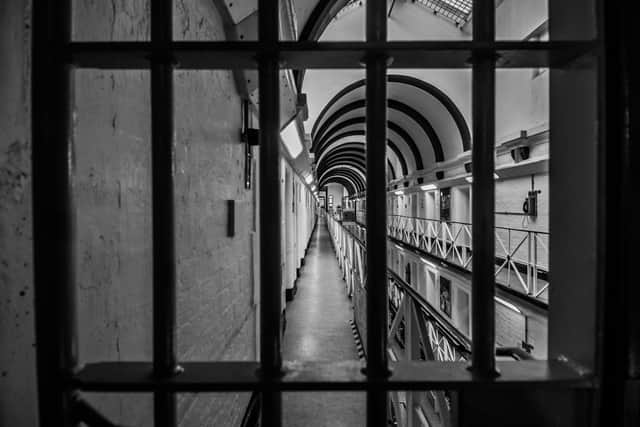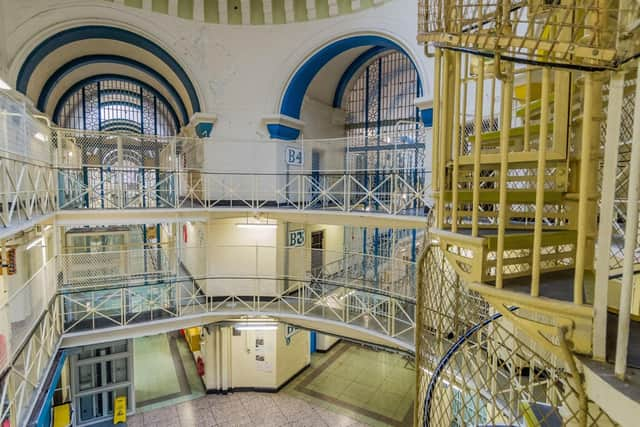The volunteers who make sure prisoners are treated fairly and humanely in Yorkshire's jails
“A person once said to me that everything you find in a town, you’ll find in the walls of a jail,” muses Stephen Clark.
“It’s where people live, there’s healthcare, there’s education, there’s work, there’s people helping prisoners deal with the reasons why they’ve offended, preparing for release and trying to find them accommodation. They’re big and complicated places.”
Advertisement
Hide AdAdvertisement
Hide AdSteve’s role is to monitor all aspects of that day-to-day life in HMP Doncaster.


He is chair of the Independent Monitoring Board (IMB) there, a team of independent volunteers tasked with ensuring that prisoners are treated fairly and humanely and that proper standards of care and decency are maintained.
Inside every prison, immigration removal centre and some short term holding facilities at airports and docks, there is an IMB, made up of ‘ordinary members of the public’.
There are vacancies listed on IMBs at Wetherby, Hull, Leeds, Askham Grange, Doncaster and Hatfield in Yorkshire, which are looking for people from all walks of life who live locally to join them in monitoring what happens behind the walls of those prisons.


Advertisement
Hide AdAdvertisement
Hide Ad“We see things that sometimes paid staff who work there don’t see. I think sometimes prisoners share things with us that they perhaps might not have mentioned to one of the staff.
“Not everyday does everything get sorted out the way I would want, but most days, if people raise things with me, I can usually do things to make it a bit better for them and I think that’s worth doing.”
Members have unrestricted access to their local prison or immigration detention centre and can talk to any prisoner or detainee they wish.
A typical monitoring visit, for example, might include time spent in the kitchens, workshops, accommodation blocks, recreation areas, healthcare centre and chaplaincy.
Advertisement
Hide AdAdvertisement
Hide AdBoard members also play an important role in dealing with problems inside the establishment. Prisoners who have an issue can put in a confidential request to see a member of the IMB.
Problems might include concerns over lost property, visits from family or friends, dietary needs, special religious or cultural requirements, or serious allegations such as bullying.
“I like to walk the floors and see what’s going on, talk to the staff but particularly talk to the men in jail about what’s happening,” Steve says,
“There’s always individual issues, there’s over 1,100 men in Doncaster so pretty much every time we go in there’ll be somebody who’s asked to see us.”
Advertisement
Hide AdAdvertisement
Hide AdHe adds: “An important part of the job is using your eyes. You’re walking around and looking for things, but also talking to prisoners and listening to their experiences, and picking up issues, either collective ones or individual ones, that they would prompt us to take a look at.
“It’s like any other big complicated place. Some things can be sorted straight away. Other things are more complicated so you talk to a manager.
“Other things are systematic so you go to the top and raise it with them. And that’s how we work in the jail.”
IMB members check that prisoners are treated fairly and decently and find out whether they are given the support they need to enable them to stop offending and rebuild their lives.
Advertisement
Hide AdAdvertisement
Hide AdThey feed back their findings regularly to the prison and report directly to the Government’s Prisons Minister and the Prison Service.
The IMBs also produce an annual report to the Secretary of State on how well the prison has met the standards and requirements placed on it.
Rebecca Major, chair of the IMB at HMP Wealstun near Wetherby, explains more: “Each year we write an annual report, which highlights any areas we remain concerned about, not just to the governor but higher up the line and also to the minister.
“One of the things at the moment is the struggle to retain prison officers, because they aren’t paid very much for the work that they do. Somebody somewhere has to find the money to pay them so that the staff shortage is sorted.”
Advertisement
Hide AdAdvertisement
Hide AdRetired civil servant Rebecca has been part of the Wealstun IMB for six years and is also a regional representative for boards across Yorkshire and the Humber.
To those thinking about joining an IMB, she says: “Prison is a hidden world for a lot of people. You need to get in there to understand what is going on.
“And I just find it quite interesting. In a prison with 800 prisoners, there’s so many things to be aware of. I enjoy that - and I enjoy talking to people, prisoners and staff, and, of course, board members.”
She adds: “These people are in prison because they’ve committed a crime but they still deserve to be treated in a humane way, in a safe environment and get support to rehabilitate so they don’t re-offend.
Advertisement
Hide AdAdvertisement
Hide Ad“You can’t get that understanding, talk to people and monitor the situation unless you’re in there.”
Both Rebecca and Steve dedicate around four days a month to the role, with Steve juggling it alongside work in health and safety and volunteering with a charity that supports feeds homeless and vulnerable people in South Yorkshire.
Rebecca says: “One of the things I’m really passionate about is being flexible because not everybody is retired with all the time in the world to go in.
“And we need people of all different ages on the boards, and not just ages, but we need diversity.”
Advertisement
Hide AdAdvertisement
Hide AdThe boards say they are looking for people “who want to make a contribution to society and who are looking to strengthen their skills as part of a life or career change”.
People are provided with training and support, and although the roles are unpaid, members can get travel, childcare and loss of earnings expenses.
“It’s a really interesting role,” Steve says. “There’s a bit of me that quite likes helping people and I love talking to people. I think I’m reasonably good at talking to the prisoners, I can relate to most people. Every time I go in I learn something and do something a bit different. And in the background I think there’s a bit of me that thinks there’s a duty - if citizens have a right to go look at what’s going on in prison and I can do that then I should do.”
To find out more about the roles, and apply, visit www.imb.org.uk
